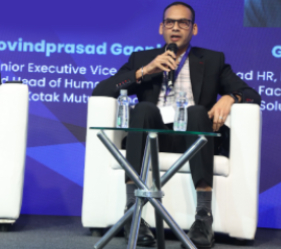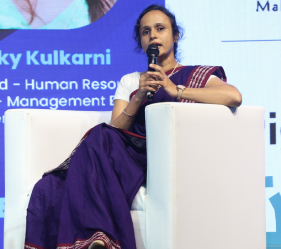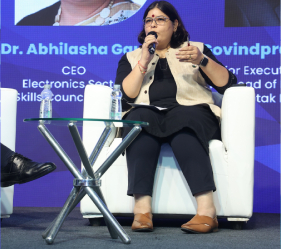The panel at MIECA 2024, titled "The Indian Paradox: Where is the Talent vs. Where is the Job?", brought together industry experts to tackle one of the most pressing issues in India's labor market—the gap between the growing pool of educated individuals and the availability of suitable employment opportunities. Moderated by Shri Kartik Narayan, CEO Staffing at TeamLease Services, the esteemed panelists included Dr. Abhilasha Gaur, CEO of Electronics Sector Skills Council of India, Shri Govind Prasad Gaonkar, Senior Executive Vice President and Head of Human Resources at Kotak Mutual Fund, Smt. Lucky Kulkarni, Director & Group Head of HR at Jeena & Company , and Smt. Gauri Das, Head HR, Marketing & Admin at India Factoring & Finance Solutions Pvt. Ltd. Together, they provided valuable insights into the growing disconnect between available talent and job opportunities and explored innovative solutions to address this pressing issue.
Key Issues Highlighted
The paradox at the heart of the discussion lies in the fact that while India produces millions of graduates annually, many of them are not immediately employable. The panelists shared insights from their respective sectors, emphasizing the disconnect between academic qualifications and the practical skills required in the corporate world.

Govindprasad Gaonkar
Senior Executive Vice President and Head of HR,
Kotak Mutual Fund
Govindprasad Gaonkar, Senior Executive Vice President and Head of HR at Kotak Mutual Fund, noted that many businesses are cannibalizing talent from within the same industries rather than expanding their hiring pools. He highlighted the need for deeper collaboration between industry and educational institutions to ensure that graduates are equipped with the necessary knowledge and skills to enter the workforce.

Lucky Kulkarni
Director & Group Head - HR,
Jeena & Company
From the logistics sector, Lucky Kulkarni, Director & Group Head of HR at Jeena & Company, expressed concerns about the cost and time involved in training fresh graduates who are not job-ready. She emphasized that the problem isn’t a lack of candidates but the lack of qualified individuals who can be put to work immediately. This presents a financial burden for companies that need to invest in training, with no guarantee that the employees will stay long-term.

Gauri Das
Head HR, Marketing & Admin
India Factoring and Finance Solutions Pvt. Ltd.
Gauri Das, Head HR, Marketing & Admin at India Factoring & Finance Solutions Pvt. Ltd., echoed similar sentiments from the banking sector. She pointed out that even for entry-level roles, like private banking, companies struggle to find candidates with the right soft skills—particularly communication and relationship management skills needed to interact with high-net-worth individuals.

Dr. Abhilasha Gaur
CEO
Electronics Sector Skills Council of India
A key point raised by Dr. Abhilasha Gaur, CEO of Electronics Sector Skills Council of India, was the importance of integrating skill development into the broader education system. She highlighted that many industries, including logistics, finance, and manufacturing, require specialized skill sets that are not covered in standard university curriculums. To address this, the government has initiated programs through Sector Skill Councils to identify gaps and offer short-term courses that enhance employability.
